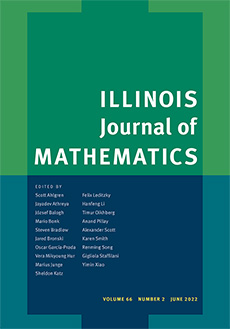Abstract
For an integer $k\ge 2$, a tuple of $k$ positive integers $(M_{i})_{i=1}^{k}$ is called an amicable $k$-tuple if the equation \begin{equation*}\sigma (M_{1})=\cdots =\sigma (M_{k})=M_{1}+\cdots +M_{k}\end{equation*} holds. This is a generalization of amicable pairs. An amicable pair is a pair of distinct positive integers each of which is the sum of the proper divisors of the other. Gmelin (Über vollkommene und befreundete Zahlen (1917) Heidelberg University) conjectured that there is no relatively prime amicable pairs and Artjuhov (Acta Arith. 27 (1975) 281–291) and Borho (Math. Ann. 209 (1974) 183–193) proved that for any fixed positive integer $K$, there are only finitely many relatively prime amicable pairs $(M,N)$ with $\omega (MN)=K$. Recently, Pollack (Mosc. J. Comb. Number Theory 5 (2015), 36–51) obtained an upper bound \begin{equation*}MN<(2K)^{2^{K^{2}}}\end{equation*} for such amicable pairs. In this paper, we improve this upper bound to \begin{equation*}MN<\frac{\pi^{2}}{6}2^{4^{K}-2\cdot 2^{K}}\end{equation*} and generalize this bound to some class of general amicable tuples.
Citation
Yuta Suzuki. "On amicable tuples." Illinois J. Math. 62 (1-4) 225 - 252, 2018. https://doi.org/10.1215/ijm/1552442661
Information





